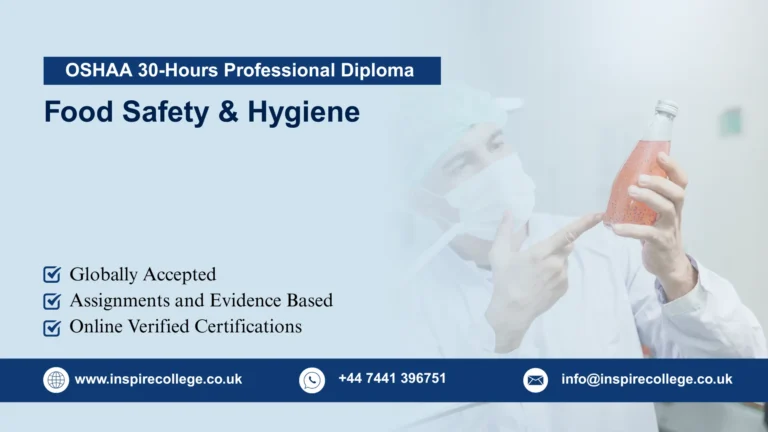
OSHAA 30-Hours Professional Diploma in Science of Food
The OSHAA 30-Hours Professional Diploma in Science of Food is a comprehensive program designed to explore the critical relationship between food, nutrition, and human health. In today’s world, where food safety, quality assurance, and nutritional awareness are more important than ever, this diploma equips learners with essential scientific knowledge and practical skills to understand how food impacts both individual well-being and global health systems.
The purpose of this course is to provide participants with a strong foundation in the principles of food science, covering areas such as food chemistry, microbiology, safety standards, preservation techniques, and the role of nutrition in promoting health. Learners will also gain insights into the global food industry, the importance of sustainable practices, and the regulatory frameworks that govern food production and distribution.
Throughout the program, learners will develop the ability to analyze the composition and properties of food, identify potential risks in handling and processing, and apply safety measures that align with international standards. The diploma emphasizes not only theoretical knowledge but also real-world applications, ensuring that participants are able to contribute effectively to food safety management, product development, and nutrition-related initiatives.
By the end of the course, graduates will be equipped with valuable skills applicable across multiple sectors including food technology, healthcare, hospitality, manufacturing, and research. Whether pursuing career advancement or expanding professional knowledge, the OSHAA 30-Hours Professional Diploma in Science of Food serves as a pathway to success in the growing fields of food science, nutrition, and safety.
The OSHAA 30-Hours Professional Diploma in Science of Food is designed to be accessible while maintaining academic and professional standards. To ensure participants can engage effectively with the course content and achieve the best outcomes, the following entry requirements apply:
- Educational Background
- A minimum of a high school diploma, secondary school certificate, or equivalent qualification is recommended.
- Candidates with prior studies in biology, chemistry, nutrition, health sciences, or related subjects will benefit from an enhanced understanding of course topics.
- Language Proficiency
- Since the course is taught in English, learners should have a good command of reading, writing, and comprehension skills.
- Non-native English speakers may be required to demonstrate language proficiency to ensure effective participation in lectures, discussions, and assessments.
- Professional or Personal Interest in Food Science
- This program is suitable for individuals working in food production, hospitality, nutrition, public health, research, or food safety management.
- It is equally relevant for learners with a personal interest in food, diet, and nutrition who wish to expand their knowledge and apply it to practical or career contexts.
- Basic Computer and Internet Access
- Participants should have access to a computer or mobile device with a reliable internet connection to engage with online learning resources, research materials, and assessments.
- Work Experience (Optional but Advantageous)
- While professional experience in food technology, nutrition, catering, or healthcare is not mandatory, it can provide valuable context and help learners apply scientific concepts to real-world scenarios.
- Commitment to Guided Learning Hours
- Learners must be willing to dedicate approximately 30 guided learning hours to complete lectures, assignments, case studies, and evaluations successfully.
Meeting these entry requirements ensures that learners can actively participate in the course, apply food science principles effectively, and gain internationally recognized certification. The OSHAA 30-Hours Professional Diploma in Science of Food is structured to benefit both beginners and experienced professionals looking to enhance their expertise in food safety, nutrition, and food technology.
Mandatory Units
The OSHAA 30-Hours Professional Diploma in Science of Food, to achieve the qualification candidates must complete all the mandatory units form the following :
Mandatory Units
- Introduction to Food Science and Nutritional Biochemistry (3 hours)
- Macronutrients and Micronutrients: Roles in Human Health (4 hours)
- Digestion, Absorption, and Metabolism of Nutrients (3 hours)
- Food Composition and Chemical Properties (6 hours)
- Food Microbiology and Safety Standards (3 hours)
- Food Processing and Preservation Techniques (4 hours)
- Functional Foods, Additives, and Nutritional Fortification (5 hours)
- Food Labelling, Packaging, and Consumer Regulations (2 hours)
By the end of this course, learners will be able to:
Introduction to Food Science and Nutritional Biochemistry
- Explore the interdisciplinary scope of food science
- Understand how food science integrates biology, chemistry, nutrition, and health sciences.
- Recognise its role in addressing global challenges such as food security, public health, and sustainability.
- Identify the fundamental biochemical components of food
- Examine carbohydrates, proteins, lipids, water, vitamins, and minerals as the building blocks of food.
- Understand how these molecules contribute to energy supply, body structure, and metabolic functions.
- Recognise the link between food composition and human health
- Learn how diet quality directly influences growth, immunity, chronic disease prevention, and overall well-being.
- Explore the consequences of nutrient deficiencies and imbalances.
Macronutrients and Micronutrients: Roles in Human Health
- Examine the structure and function of carbohydrates, proteins, and fats
- Learn how each macronutrient contributes to energy metabolism, tissue repair, and regulatory processes.
- Understand differences between simple and complex carbohydrates, essential and non-essential amino acids, and saturated vs unsaturated fats.
- Understand the physiological roles of vitamins and minerals
- Explore water-soluble and fat-soluble vitamins in processes like energy release, bone health, immunity, and antioxidant defense.
- Recognise the importance of minerals such as iron, calcium, zinc, and potassium in cellular and systemic functions.
- Evaluate dietary sources and intake recommendations
- Identify major food sources of key nutrients.
- Learn about Recommended Dietary Allowances (RDAs), Dietary Reference Intakes (DRIs), and their application in health promotion.
Digestion, Absorption, and Metabolism of Nutrients
- Explain the digestive processes of the human body
- Study the mechanical and chemical breakdown of food from mouth to intestine.
- Identify the role of enzymes, hormones, and digestive organs.
- Understand macronutrient metabolism for energy production
- Learn how carbohydrates undergo glycolysis, proteins enter amino acid catabolism, and fats undergo beta-oxidation.
- Examine ATP as the body’s main energy currency.
- Identify factors influencing nutrient bioavailability
- Explore the impact of food preparation, antinutrients, individual physiology, and gut health on absorption efficiency.
Food Composition and Chemical Properties
- Analyse major food components
- Understand the role of water in food stability and texture.
- Study proteins, lipids, and carbohydrates as functional and nutritional elements of food.
- Explore the impact of chemical properties on food quality
- Learn how molecular structures affect flavour, aroma, solubility, and digestibility.
- Examine chemical reactions such as Maillard browning and lipid oxidation.
- Evaluate the effects of cooking and processing
- Understand how heating, freezing, and mechanical processing change nutritional content and sensory qualities.
- Explore the balance between enhancing safety and preserving nutrients.
Food Microbiology and Safety Standards
- Identify foodborne pathogens and microbial hazards
- Learn about bacteria, viruses, and fungi that cause foodborne illnesses.
- Understand conditions that encourage microbial growth in food.
- Understand principles of hygiene and contamination control
- Apply Hazard Analysis and Critical Control Points (HACCP) principles.
- Study best practices in handling, storage, and preparation to ensure food safety.
- Examine legislation and safety standards
- Explore international food safety frameworks and local regulatory requirements.
- Recognise the importance of compliance in protecting consumers.
Food Processing and Preservation Techniques
- Study traditional and modern preservation methods
- Explore canning, drying, fermentation, freezing, pasteurisation, and irradiation.
- Understand effects of processing on nutrient retention
- Examine how different preservation methods impact vitamin stability, protein quality, and bioavailability.
- Assess the benefits and drawbacks of preservation
- Consider shelf life extension, reduced food waste, and improved safety versus potential nutrient loss and chemical changes.
Functional Foods, Additives, and Nutritional Fortification
- Define and evaluate functional foods
- Study foods that provide health benefits beyond basic nutrition, such as probiotics, prebiotics, and omega-3 enriched products.
- Understand the role of food additives
- Learn about preservatives, flavour enhancers, stabilisers, and colourants.
- Explore regulatory guidelines for additive approval and safe usage.
- Examine principles of food fortification
- Understand how essential nutrients are added to foods (e.g., vitamin D in milk, iodine in salt).
- Recognise fortification’s role in combating malnutrition and public health deficiencies.
Food Labelling, Packaging, and Consumer Regulations
- Interpret nutrition labels and ingredient lists
- Develop skills to read and analyse calorie content, macronutrient breakdowns, and health claims.
- Understand labelling laws and consumer rights
- Explore mandatory requirements such as allergen labelling, expiration dates, and country of origin.
- Study the role of regulatory authorities in ensuring transparency.
- Examine the influence of packaging
- Understand how packaging ensures food safety, prevents spoilage, and influences consumer behaviour through design and marketing.
This course is ideal for individuals who wish to advance their expertise in food science, nutrition, and health applications. It is particularly designed for:
- Nutrition and wellness professionals
- Dietitians, nutritionists, and wellness practitioners who want to strengthen their scientific understanding of food composition and its effects on human health.
- Professionals seeking evidence-based insights to better support clients in clinical, community, or wellness settings.
- Food industry professionals
- Individuals working in food manufacturing, quality control, product innovation, and regulatory compliance.
- Those responsible for food labelling, packaging, or safety standards who need deeper knowledge of nutrition and food biochemistry.
- Health educators and communicators
- Teachers, trainers, and public health professionals delivering education on diet, food safety, and lifestyle choices.
- Professionals engaged in community health campaigns or wellness programs.
- Fitness trainers and wellness coaches
- Personal trainers, health coaches, and sports nutrition advisors supporting clients with scientifically grounded dietary recommendations.
- Professionals linking physical performance with nutrition strategies.
- Culinary experts and catering professionals
- Chefs, caterers, and food service providers who wish to integrate nutritional principles into menu design, meal planning, and functional food preparation.
- Students and career changers
- Individuals preparing for further academic study in dietetics, food technology, or public health.
- Learners transitioning into nutrition-related careers from other fields who require a strong foundational knowledge.
Accessibility of the Course
- This diploma is open to participants from both scientific and non-scientific backgrounds.
- No prior academic training in food science is required, making it accessible to beginners while still offering depth for professionals.
- The course combines theoretical knowledge with practical application, ensuring relevance across multiple career pathways.
Register Now
OSHAA 30-Hours Professional Diploma in Science of Food






